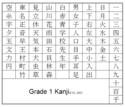|
>>
|
No. 26
File
132928228998.gif
- (17.57KB
, 598x511
, kanjifirst.gif
)

>>22
To this day I still try and target young children's books and manga, obviously that's the stuff mostly targeted at new readers. They also come with furigana, which can help you learn the kanji and allow you to say the sentences aloud.
Practice is just more or less a repetition game with more or less all Asian languages, There's a good web app called Skritter that could help you learn kanji, especially if you have a tablet, but I don't personally use it.
The way I did it was simply taking a chart like the one I attached, took a notebook and practiced writing the kanji itself (to ingrain it in your head) at different sizes (important), as well as writing the definition (ideally you would accompany it with a visual aid, but I'll be fucked if I can draw) and the different pronunciations of the kanji and different forms. Once you get just a few kanji down, try and write short, simple sentences with them. Unfortunately there's no way to test your skills outside of running it through a machine translator, which aren't very good, but if nothing else it will help you get structure down.
Unfortunately, Japanese like any other language has a large amount of nuance associated with it, there are many things that you just can't get in a dictionary that are common sayings or particle nuances that can be frustrating.
The idea is to try and teach yourself the same way children learn the language naturally, there's no perfect way to do it but it's all about getting the individual definitions of the kanji pounded in your head. Even then, it won't be perfect unless you practice semi-frequently.
For speaking, I would suggest Rosetta Stone and watching as much Japanese media as you possibly can and paying close attention to speaking patterns and such. Since songs really highlight the different syllables and make them easy to remember. Try taking lines from a subbed anime and translate it yourself with the help of a dictionary and try to see how the translators came up with the translations they did.
|